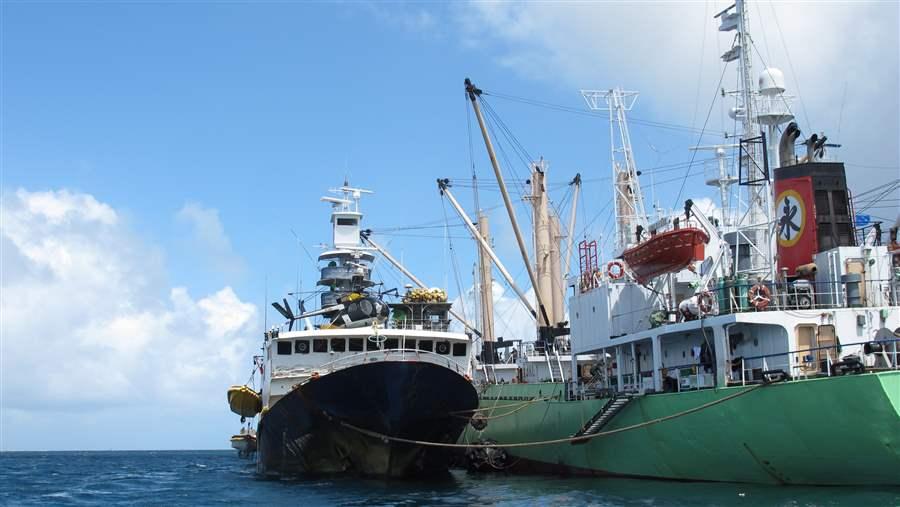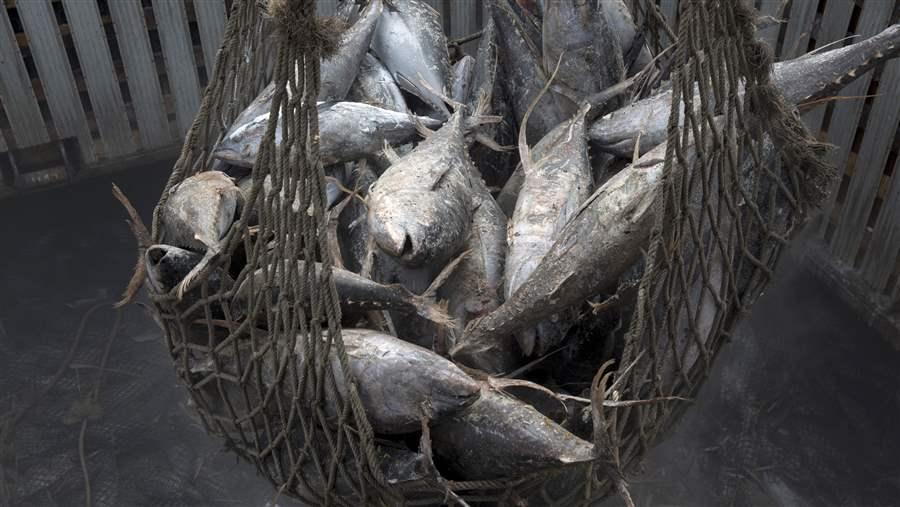Best Practices for Transshipment
Global reforms to policies for transferring catch at sea would help combat illegal fishing
Overview
Transshipment of catch between vessels plays an enormous role in the global commercial fishing industry. Hundreds of refrigerated cargo vessels, or fish “carriers,” take fresh catch from thousands of fishing vessels each year and bring it to shore for processing.
Despite the vast impact on international fisheries, however, regulatory control and monitoring of transshipment are inadequate, especially when it occurs at sea. These gaps create opportunities for illicit activities, such as misreporting or non-reporting of catches, that result in the laundering of millions of dollars of illegally caught fish annually.1 These circumstances also foster conditions that are conducive to trafficking in weapons, drugs, and people.2
Reforming how transshipment is carried out is crucial for healthy fisheries and for ensuring that illegal activities are detected—or deterred before they can happen.
The Pew Charitable Trusts calls on all flag States, coastal States, port States, and members of relevant regional fisheries management organizations (RFMOs) to ban transshipment at sea until the best practices outlined here are implemented. Doing so would ensure that transshipment is legal and verifiable and that the transfer of catch does not contribute significantly to illegal, unreported, and unregulated (IUU) fishing. These practices also would help RFMOs get complete and accurate information and data sets on transshipping that support effective fisheries management and quality science. However, to reduce opportunities for IUU activities, appropriate authorities at all levels must be ready and willing to act when they receive evidence of non-compliance.
Best practices related to reporting
To make reporting more complete and uniform, the relevant authorities should:
- Require all transshipment events to be reported to the relevant flag State, coastal State, port State, and RFMO Secretariat, regardless of the transshipment event location or origin of catch being transshipped.
- Update all transshipment reporting notifications, declarations, and reporting forms to include the type and format of data set out in standards to be developed by the United Nations Food and Agriculture Organization (FAO). Information specified in Annexes A and C of the FAO’s Port State Measures Agreement should be the minimum required to be collected, and reporting should include details on the amount and type of bycatch transshipped.
- Mandate that all authorized vessels intending to transship within a specific RFMO convention area provide electronic notification of their entry into those waters to the relevant flag State and RFMO Secretariat. That notification should include confirmation of the vessel’s compliance with near real-time vessel monitoring system (VMS) reporting and observer coverage requirements.
- Require that all authorized vessels intending to transship submit electronic pre-notifications at least 24 hours beforehand and that they post declarations within 24 hours after the event to the relevant flag State, port State, coastal State, and RFMO Secretariat for every transshipment that occurs before the first point of landing for the catch, regardless of the location of transshipment.
- Mandate that observers submit electronic reporting forms to the relevant flag State, coastal State, port State, and RFMO Secretariat within 24 hours after each transshipping event as an independent means to verify the vessel’s reporting.
Best practices related to monitoring
To make monitoring most effective, RFMOs and other relevant authorities should:
- Require 100 percent observer coverage (human, electronic, or a combination) on board both the fishing vessel and the carrier vessel for all transshipping events, regardless of whether they occur in a national or regional area of competence. Minimum standards must also be set for all processes and procedures put in place for collection of observer information.
- Ensure that all vessels authorized to engage in transshipping activities have access to an independent system of fully staffed, trained, and certified observers from national or regional observer programs certified by the relevant RFMO and with a clear mandate to collect information and data for both scientific and compliance purposes.
- Require all vessels authorized to engage in transshipping activities to have an operational VMS unit on board that can help relevant authorities monitor and track these vessels port-to-port with stringent near real-time reporting requirements.
- Mandate that any manual reporting arrangements in case of a VMS unit malfunction or failure include requirements for secondary/backup reporting units for all carrier vessels and a requirement that vessels return to port immediately if the VMS unit continues to malfunction or fail.
Best practices related to data-sharing
To ensure effective sharing of data, relevant authorities should:
- Establish and harmonize transshipping data-sharing procedures among relevant flag State, coastal State, port State authorities, and RFMO Secretariats
Conclusion
Establishing clear rules for transshipment is essential to ensure a strong, legal, and verifiable seafood supply chain and to reduce the likelihood that illicit activities will occur. If all parties involved in regulating global transshipment implement these best practices, then industry players, consumers, and governments can be assured that adequate guidelines are in place to make transshipment a more effective and secure method for transferring fish from the sea to land—and one that will not significantly contribute to IUU fishing.
Endnotes
- MRAG Asia Pacific, “Towards the Quantification of Illegal, Unreported and Unregulated (IUU) Fishing in the Pacific Islands Region” (2016), http://www.ffa.int/files/FFA Quantifying IUU Report - Final.pdf.
- Christopher Ewell et al., “Potential Ecological and Social Benefits of a Moratorium on Transshipment on the High Seas,” Marine Policy 81 (2017): 293–300, https://doi.org/10.1016/j.marpol.2017.04.004.










